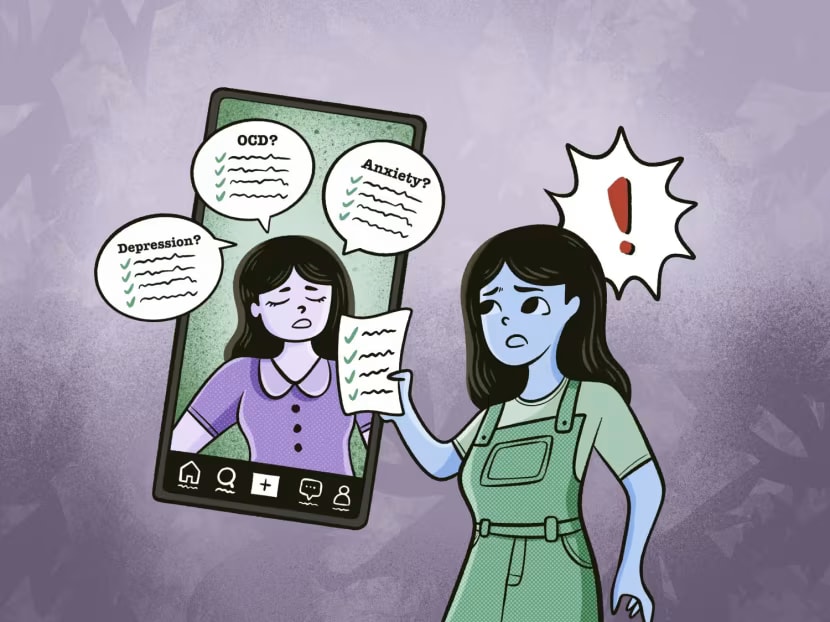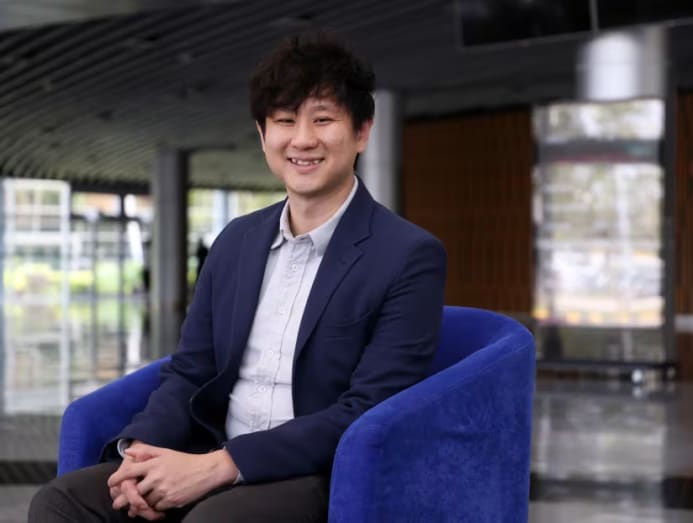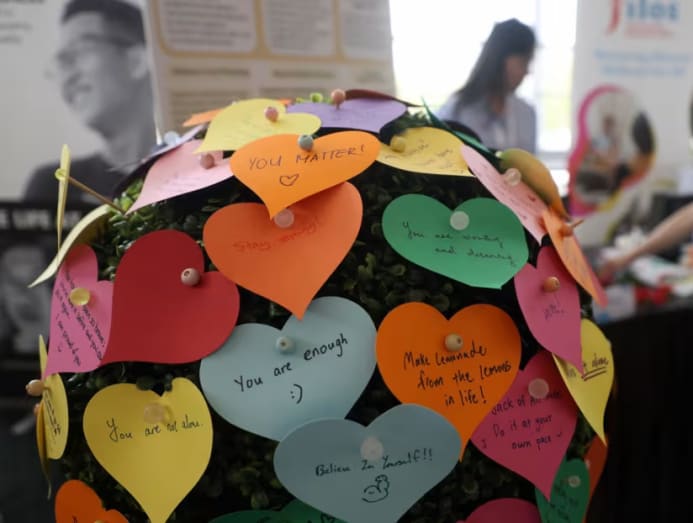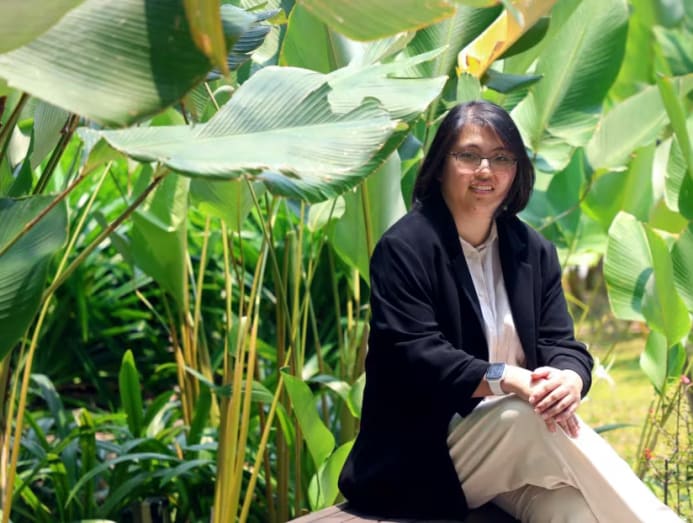The Big Read: Mental health no longer dirty words as awareness grows - but are some youths adopting labels too loosely?

Greater awareness of mental health among youths and accessibility of information online has led to a trend known as “therapy speak” where youths use language and terms related to mental health in everyday conversations. (Illustration: TODAY/Nurjannah Suhaimi)
- Greater awareness of mental health among youths and accessibility of information online has led to a trend known as “therapy speak” where youths use language and terms related to mental health in everyday conversations
- Experts say that while this indicates a broader, positive cultural shift in the way Singaporeans think and talk about mental health, there are pitfalls
- These include potentially dangerous misinterpretations of mental health and an increase in self-diagnoses that may not be accurate
- Meanwhile, youths with mental health struggles say that reactions of their loved ones to their conditions can still vary extremely from denial and dismissive to showing care and concern
- The youths and mental health experts say that there is a need to beef up literacy on the subject through educating employers, parents and children from an early age
SINGAPORE: When then-19-year-old Ashley Poo told friends that she was diagnosed with clinical depression and anxiety, the young woman who had always come across as confident and assured was greeted with a mixture of shock and confusion.
Remarks like “why are you depressed”, “your issues are not that severe”, and “how can you be struggling when you have such a good family?” were thrown at her.
Such reactions aggravated the poor mental state that the Republic Polytechnic student, now 22, found herself in, resulting in multiple emergency admissions to the hospital over the years.
Contrarily, when former radio deejay Kim Anne Tan shared with others that she had been diagnosed with dysthymia - also known as persistent depressive disorder - the responses she received were nothing but supportive.
“I've never met a single person who was like, weirded out by it. Everyone, even if they didn't understand what the condition was or they weren't sure, nobody was negative,” the 28-year-old said.
From TODAY’s recent interviews with Ms Poo, Ms Tan and five other youths who had struggled with their mental health, one common thread that emerged with regard to how loved ones responded to their battle against mental illness was how extreme those reactions could be - from denial and dismissive to showing care and concern.
One interviewee who did not wish to be named said that her parents had hinted that she was part of a “soft” generation of youths.
“My mother would say in Mandarin, ‘I’ve eaten more salt than you’ve had grains of rice’,” she said, implying that people “back in the day” had more challenges to deal with.
Another interviewee spoke of how her parents neither accepted nor validated her struggles, and started to “push her away” after she began showing signs of reclusiveness due to trauma - in stark contrast to how they treated her brother who had been diagnosed with another mental health disorder.
As the world marks Mental Health Day on Oct 10 amid global concerns that today’s youths are more mentally unwell than previous generations due to a myriad of uncertainties, TODAY spoke to mental health experts, advocates and survivors for some insights into how Singapore is dealing with the issue, and how youths can be better supported in their struggles.

YOUTH MENTAL HEALTH A PRESSING ISSUE
Back in 2016, a Singapore Mental Health Study conducted by the Institute of Mental Health (IMH) showed that one in seven persons here had experienced a mood, anxiety or alcohol use disorder in their lifetime.
Among them, young people aged 18 to 34 had the highest prevalence rate of 21.6 per cent.
Six years on, the prevalence of mental health issues among youth appeared to have worsened, with the highest proportion of Singaporeans with poor mental health coming from the 18 to 29 age group at 25.3 per cent, according to the 2022 National Population Health Survey conducted by the Ministry of Health (MOH), which was published last month.
Mental health professionals and advocates told TODAY that since the onset of the COVID-19 pandemic in 2019, during which many Singaporeans were forced to limit their social interactions with others, the subject of mental health has increasingly pervaded the country’s social consciousness.
Campaigns like the National Council of Social Service’s (NCSS) Beyond the Label and the Health Promotion Board’s “It’s OKAY to Reach Out” were launched in 2018 and 2021 respectively.
Meanwhile, the government’s formation of the Interagency Taskforce on Mental Health and Well-being in 2021 resulted in the unveiling of a new national strategy to tackle the issue on Thursday (Oct 5).
A new specialised care facility - a pilot to support youth who are at risk of suicide - is among the initiatives the government intends to roll out.
Panel discussions and presentations focusing on youth mental health were also a key part of the two-day Singapore Mental Health Conference held at the Singapore Expo earlier this week.
But despite local and international surveys depicting a global “youth mental health crisis”, some mental health advocates said that people must not jump to the conclusion that the current generation of youths, here or overseas, are “particularly susceptible” to poor mental health.
According to Ms Anthea Ong, founder of advocacy group SG Mental Health Matters, youths will “always be the most challenged in any generation” as they would have to deal with the instability that comes with hormonal and neurological changes, as well as societal stress factors like examinations and entering the workforce.
“We must also know that today’s youths have a lot more mental health awareness.
“Therefore in surveys, studies or conversations, they're going to be more equipped to indicate how they feel in more specific terms,” added the former Nominated Member of Parliament.
Ms Ong’s comments were made in reference to a trend coined internationally as “therapy speak” - the adoption and use of therapeutic language and terms outside of the clinical setting, typically in everyday conversations.
Mental health advocates and young interviewees diagnosed with mental health conditions, whom TODAY spoke to, agreed that the rise in mental health awareness had led to terms associated with therapy-speak such as “triggered”, “boundaries” and “gaslighting” becoming increasingly common within the social lexicon.
While such language indicates a broader, positive cultural shift in the way Singaporeans think and talk about mental health, said experts, they also cautioned that it could lead to unintended consequences.

FLIP SIDE TO GREATER AWARENESS - SELF-DIAGNOSIS
For one, the increase in therapy-speak in social discourse could lead to the trivialisation of those who suffer from mental health issues, said some of TODAY’s interviewees.
Using the word "trauma" callously, for instance, could trigger "a real trauma" in another person, said Ms Ong.
“And if that person who was listening in feels trivialised without the right support system, it's possible that person could go into a very unsafe place without any help available.”
There is also the concern that youths might be too quick to diagnose themselves with mental illnesses based on symptoms found online, even though these may not be accurate.
Indeed, some mental health practitioners who offer counselling and therapy services said that they have observed more youths entering consultations with a preconceived idea of the mental illness they have before being officially diagnosed.
Dr Charmaine Tang, chief of the department of psychosis at IMH, said that her initial reaction to such patients was the worry that normal experiences in people's daily lives might be "over-medicalised".
For people who face everyday emotions like stress, anxiety or low mood, “we don't want to equate that straightaway to - ‘oh, you've got depressive disorder’, or ‘you've got a diagnosis’,” she said.
A misdiagnosis or overdiagnosis of mental health conditions can also potentially lead to a “diversion of already-scarce mental health resources away from those who need them”, said Dr Adrian Loh, a senior consultant psychiatrist at Promises Healthcare, a psychiatry and psychology clinic.
“It can lead to more people thinking that an underlying condition will limit their own chances of flourishing in life. It can also paradoxically cause more stigma if people come to doubt the legitimacy of those seeking help,” he added.
Mr Asher Low, founder of the mental health non-profit organisation Limitless, said that such misuse of words tends to stem from an unintentional misunderstanding of their original meanings, and can result in “unhelpful” perspectives on dealing with personal problems.
He cited the example of the word “boundaries” - which refers to one protecting one's own free time, personal space and even money from being taken away by others - but may be interpreted as cutting “everyone off”.

However, despite these potential pitfalls of the increased prevalence of therapy-speak, all the experts interviewed emphasised that on balance, this trend is a step in the right direction for society.
Dr Tang said that therapy-speak also has the potential to help people articulate their emotions and symptoms better, for instance.
“It might in fact be an opportunity to revisit some of these symptoms that the person is sharing with you and then help the person to make sense of it.
“And through that process, (we can) also provide some proper education and hopefully improve the person's mental health literacy and knowledge as well,” she added.
Agreeing, Mr Low believes that it is a good thing for youths to be cognisant of their own symptoms, which would help mental health professionals identify core issues and make an accurate diagnosis.
For Mr Justin Loo, head of programmes at mental health charity Resilience Collective, he regards such therapy-speak as “inevitable" as society undergoes the process of normalising conversations about mental health.
“More importantly, on a wider scale, we need to have conversations and awareness-building about what these things really mean.
“This is so that people can have the ability and are equipped to then regulate their own language, and know when, and when not, to use it,” he said.
EDUCATION KEY IN PROMOTING LITERACY
For many people, the words “mental health” tend to conjure up the idea of mental illness - a fundamental misunderstanding of what the term encompasses, said Ms Ong of SG Mental Health Matters, who is also leading a workgroup developing a national suicide prevention strategy.
She added that many in society, institutions included, currently assess a person’s mental health based on “a single continuum - from healthy and thriving to illness”.
“The World Health Organization's definition of mental health is not merely the absence of mental disorders, it also refers to well-being,” she said.
“So we must begin to understand mental health in a more nuanced manner, which I had also learnt from my own mental health experience.
"A person can be languishing without being mentally ill because it's very human to feel down sometimes. Yet another could be flourishing with a diagnosed mental health condition with a treatment and support programme."
Ms Ong and other mental health experts told TODAY that a large part of removing the stigma attached to mental health is related to improving emotional and mental health literacy levels in our society.
While emotional literacy refers to the ability to recognise, understand, express, and manage one's own emotions as well as those of others, mental health literacy is possessing accurate information, beliefs, and attitudes about mental health conditions.
Both forms of literacy are important in helping those who suffer from mental illnesses and mental health challenges feel accepted in society.
For Robin (not her real name), who was diagnosed with depression at the age of 15, she believes that mental health education has to begin from an early age.
“To me, kids are a lot smarter than we give them credit for. Maybe they don't have the faculties to explain exactly what they're feeling, but I think they are pretty intuitive. If you make things the norm for them, that's what they learn to pick up,” said the 27-year-old.
Robin told TODAY that she and others like her often struggle to come to terms with the fact that their friends and loved ones do not understand why they feel the way they do - especially if they come from what is perceived as a “privileged” background.
For her, being unable to pay attention and perform well in school had triggered in her a sense that the situation was "all or nothing".
“I couldn't understand why I was feeling the things that I was feeling because I guess really, I had nothing to worry about … like taxes or bills,” she said.
“Like, what kind of 15-year-old thinks about existential dread?”
“(But) if you tell kids that there are certain mental conditions that you may experience as you grow older, then not just those who feel like they need help can feel comfortable, but neurotypical people can also have an awareness of it and understand them.”
Mr Sam Roberts, founder and director of the Olive Branch Counselling, Psychology and Therapy Clinic, added that a child’s psychological development hinges on the environment they are brought up in - one that is created by parents. It is therefore crucial for parents as well to be equipped with a good understanding of both types of literacy.
Under Singapore’s new National Mental Health and Well-being Strategy, a “toolbox” is being developed to help parents build stronger relationships with their children.
Mental health education lessons would also be incorporated into the refreshed Character and Citizenship Education curriculum in schools as part of a separate initiative under the strategy.
Away from the family, there also exists a sentiment among some youths that employers may not be particularly “genuine” in their efforts to care for the mental well-being of their employees.

Sally (not her real name), a 25-year-old working in the healthcare industry who has been seeing a therapist for the past three months for her own mental health struggles, feels that workplace initiatives aimed at improving mental wellness might have started off as well-intentioned, but has “gotten to the point where it feels performative”.
She cited the example of how, in her search for companies who were accepting of employees with mental illnesses, firms tended to trot out mental health benefits that were largely inadequate, like “one wellness off-day”, or a minimal amount of reimbursement for a single therapy session.
Her view was echoed by Mr Loo of Resilience Collective, who said that it is important for institutions to “operationalise” its mental wellness initiatives in a mindful manner - focusing on both the needs of its employees and the need for results.
“It should not be productivity at the expense of mental health, but productivity as a result of attending to mental health," he said.
“While initiatives like monthly staff fitness programmes are well-meaning, it needs to go beyond that into something integrated into your policies and routine practices, so that it becomes something that we constantly are attuned to, something that we are mindful about.”
HOW TO HELP THOSE WITH PROBLEMS
At the core of mental health literacy is the understanding of mental health conditions, and by extension, the ability to distinguish between a temporary mental setback from certain circumstances and a protracted mental health challenge that might need clinical support.
According to Dr Loh of Promises Healthcare, the symptoms of many mental disorders are often a common feature of a person's life experience, and knowing when to seek professional help is important.
He said that the symptoms which may warrant concern can be broken down using a framework of three "D"s and two "P"s:
- Distress: The level of discomfort and suffering related to the symptoms
- Dysfunction: The resulting impact of the symptoms on one's roles and responsibilities
- Deviation: The degree of divergence from accepted social norms like personal space and physical touch between people
- Pervasiveness: The breadth across settings in which the symptoms manifest - like at home, in school, or in social situations
- Persistence: The duration across time the symptoms are present
Mr Roberts of Olive Branch also suggested various coping strategies to deal with the stresses of daily life.
This includes dedicating time to self-care activities or hobbies that one enjoys, attempting guided, mindfulness meditation via apps or videos to help reduce one’s anxiety, and making an effort to connect with friends who can provide the person with emotional support.
However, Mr Low of Limitless said that people should seek professional help when they notice three key things: Their usual coping mechanisms do not work; the symptoms have persisted for an extended period of time; and it severely affects their quality of life.
For those who hope to be of better help to friends and loved ones who may be struggling with their mental health, the youths whom TODAY spoke to shared about the kind of support they would have liked when they were grappling with the problem.
Ms Poo, who shared that she had previously lost a few friends to suicide over the years, said that it is important for people not to be too “quick to judge or offer solutions”, and instead simply lend a sympathetic ear.
While she still struggles with her mental health from time to time, Ms Poo believes that she has a clearer awareness of her condition today and has made it her mission to spread better mental health awareness, not wanting “the next generation to experience what I went through”.
The integrated events management student is now a mental health advocate and youth fellow with the digital stress management platform mindline.sg.

For 26-year-old Cheryl (not her real name), who had been diagnosed with anxiety, depression and post-traumatic stress disorder, simple affirmations and check-ins are also crucial.
“It could be stuff that's affirming like ‘that must have been a very difficult time for you’, or ‘I hear you; how can I support you during this difficult time?’ which helps someone be seen.”
She said that it would help go a long way to help those struggling with mental health conditions for others around them to ask whether they have been sleeping, eating or drinking well and occasionally offering to go for meals together.
Ultimately, a balance must be struck between personal support and professional help, said Mr Roberts.
A friend or relative’s willingness “to be a supportive and empathetic presence” in the life of a person facing mental health issues “can make a significant difference in their journey toward recovery”, he noted.
“Remember that while you can provide valuable support, professional help from a qualified mental health provider is essential for their well-being.”
This article was originally published in TODAY.















